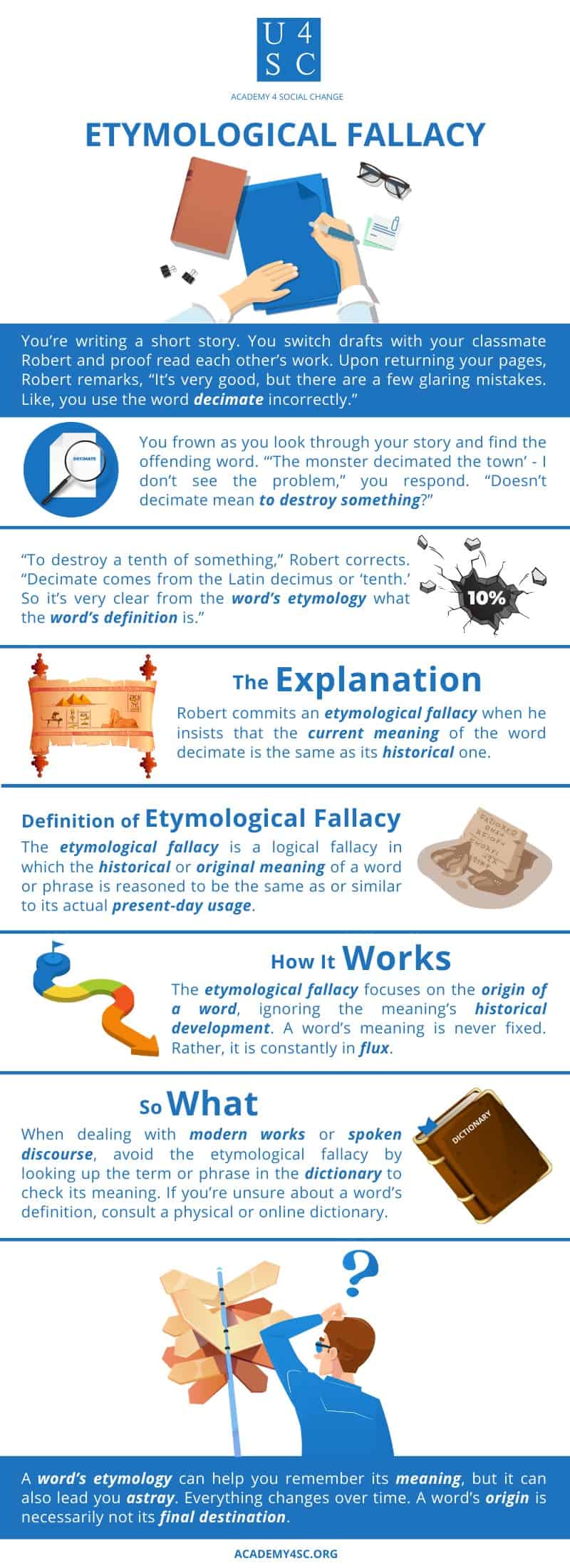Background
You’re writing a short story for a class assignment. You switch drafts with your classmate Robert and proofread each other’s work. Upon returning your pages, Robert remarks, “It’s very good, but there are a few glaring mistakes. Like, you use the word decimate incorrectly.”
You frown as you look through your story and find the offending word. “‘The monster decimated the town’ - I don’t see the problem,” you respond. “Doesn’t decimate mean to destroy something?”
“To destroy a tenth of something,” Robert corrects. “Decimate comes from the Latin decimus or ‘tenth.’ So it’s very clear from the word’s etymology what the word’s definition is.”
Explanation
Robert commits an etymological fallacy when he insists that the current meaning of the word decimate is the same as its historical one. While it’s true the prefix dec- would lead one familiar with Latin to assume decimate has something to do with the number ten, the word’s meaning has changed over time, making that meaning seldom used now.
Etymological Fallacy
The etymological fallacy is a logical fallacy in which the historical or original meaning of a word or phrase is reasoned to be the same as or similar to its actual present-day usage. This misconception most commonly occurs when the older meaning of a word is insisted to be its “proper” meaning.
How It Works
Etymology is the origin of a word and the development of its meaning. The etymological fallacy focuses on the origin of a word, ignoring the meaning’s historical development. A word’s meaning is never fixed. Rather, it is constantly in flux. A word’s connotations might become part of its denotation. A word with a very narrow, precise definition might become part of the common vernacular with a new, broader meaning. Some words might become popular for their slang usage and come to exclusively be used for that purpose. As words are used and misused, their definitions change. The etymological fallacy ignores that change.
So What
Etymology can be very helpful in understanding how a word’s definition developed into its current meaning, but a word’s origin does not always determine what its contemporary meaning is. Some words barely change over centuries, but others change drastically in far shorter spans.
When dealing with modern works or spoken discourse, avoiding the etymological fallacy can be as easy as looking up the term or phrase in the dictionary to check its meaning. If you’re unsure about a word’s definition, consult a physical or online dictionary.
For historical works, try to determine what’s the most likely definition of the phrase or term in question. An author would be hard pressed to use a word’s three hundred year obsolete original meaning when his audience would assume its common vernacular meaning. There are plenty of online word etymology resources that you can use to investigate an older work’s intended meaning of a word. Pay attention to context as well. You’ll be able to pick up some clues as to a word’s likely meaning in the work itself - check it against what you find in etymology resources, like the Oxford English Dictionary.
A word’s etymology can help you remember its meaning, but it can also lead you astray. Everything changes over time. A word’s origin is necessarily not its final destination.



